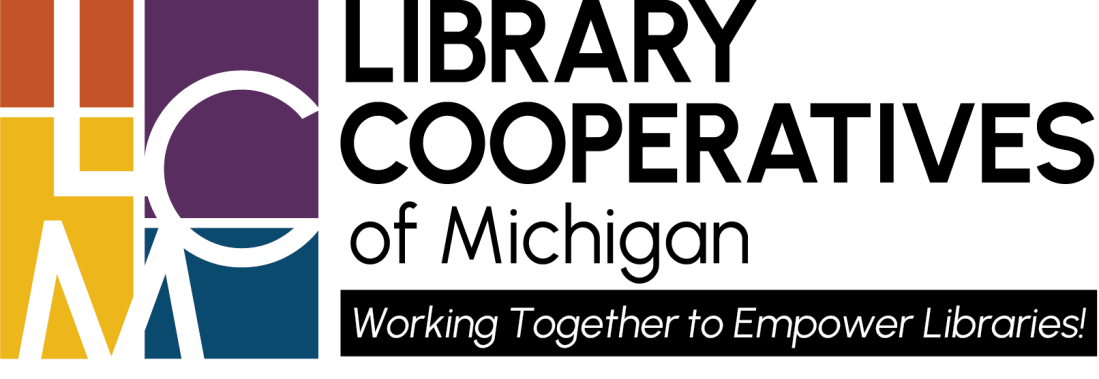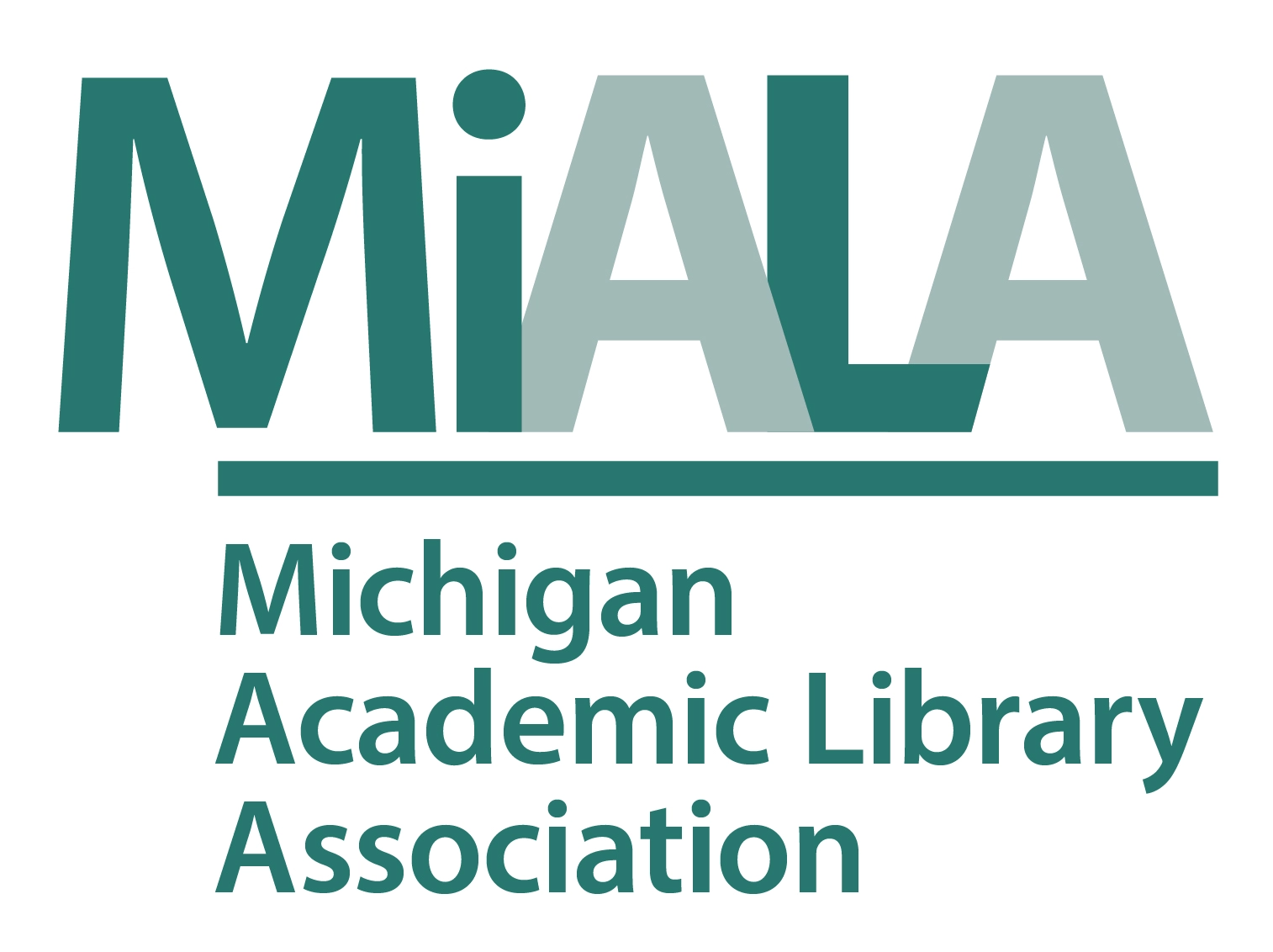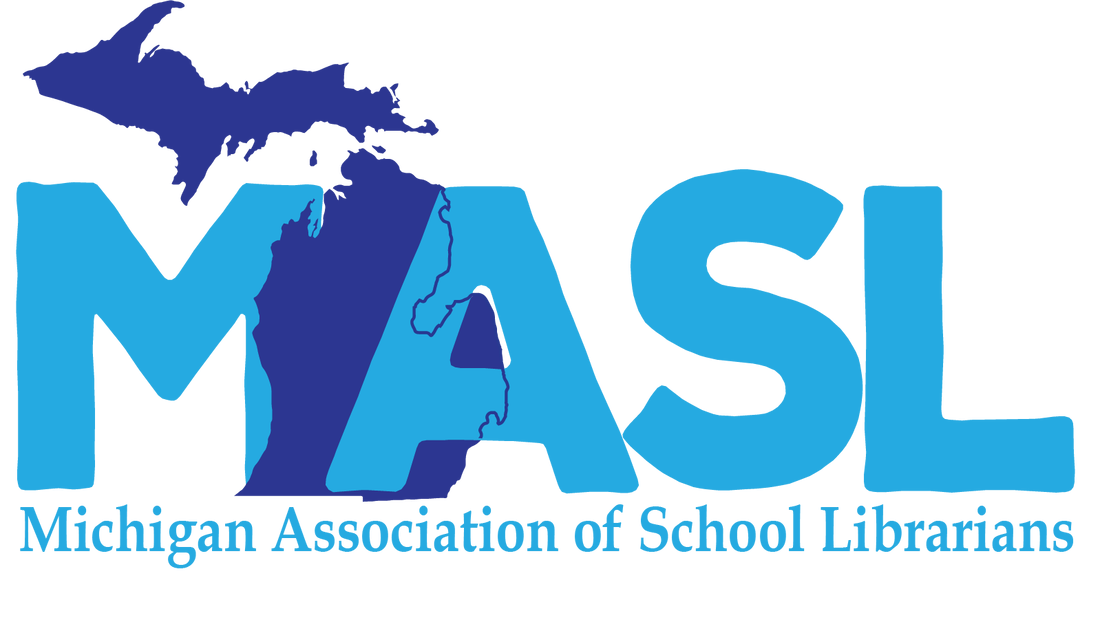Racial Equity Resources
MLA is committed to doing everything we can, in our libraries and our communities to promote justice and equality for all. We will continue to add to these resources in the coming weeks and months as we plan and act on our commitment to equity, diversity and inclusion, in our organization, libraries and communities.
MLA Equity Fund Grants
MLA has many restricted funds that have been donated to us over the years, most with specific use attached. As we looked for ways to recognize the needs of underrepresented individuals within the library community, the MLA board approved a change to a fund that didn’t have any restrictions or ties. With the dollars already within the fund, and a commitment to fundraise each year to keep it a healthy resource, we proudly provide the MLA Equity Fund Grants.
MLA affirms its commitment to diversity and inclusion by seeking the broadest participation of racially and ethnically diverse librarians and library support staff who provide leadership in the transformation of libraries and library services.
The MLA Equity Fund will be used as an individual grant geared toward the professional development of individuals currently underrepresented in the library profession. This fund will reduce financial barriers and uplift the professional development for Black, Indigenous, Latinx, Asian, North African, and Middle Eastern individuals by providing resources to be used for memberships, attendance at workshops, educational events or conferences of applicants’ choosing, or for other purposes that they believe increase their ability to impact and transform the library profession.
Download the MLA Equity Fund Guidelines for complete details. Applications should be submitted using the online form.
Click here to view a printable flyer with more information about scholarships and opportunities for library workers of color.
Tools
21-Day Racial Equity Challenge, Michigan League for Public Policy
mlpp.org/21-day-racial-equity-challenge
Racism Scale: Where do you Fall?
racismscale.weebly.com
COVID Resources that Take Race Seriously, Embrace Race
www.racialequitytools.org/plan/informing-the-plan/organizational-assessment-tools-and-resources
The Diversity Style Guide
The Diversity Style Guide is a resource to help journalists and other media professionals cover a complex, multicultural world with accuracy, authority and sensitivity. The guide is a project of the Center for Integration and Improvement of Journalism at San Francisco State University, brings together definitions and information from more than two dozen style guides, journalism organizations and other resources.
https://www.diversitystyleguide.com/
Guidance for Reporting and Writing About Racism from Syracuse University
https://onlinegrad.syracuse.edu/blog/writing-about-racism/
Organizations
Black Lives Matter
www.Blacklivesmatter.com
Color of Change
www.colorofchange.org
Movement for Black Lives
www.m4bl.org
Equal Justice Initiative
www.eji.org
Be the Bridge, led by Latasha Morrison at Be the Bridge
www.bethebridge.com
EmbraceRace
www.embracerace.org
GARE – Government Alliance on Race and Equity
https://www.racialequityalliance.org/
Library Associations
American Indian Library Association (AILA)
www.ailanet.org
Asian/Pacific American Librarians Association (APALA)
www.apalaweb.org
Black Caucus of the American Library Association (BCALA)
www.bcala.org
Chinese American Librarians Association (CALA)
www.cala-web.org
National Association to Promote Library and Information Services to Latinos and the Spanish Speaking (REFORMA)
www.reforma.org
Other Resources
ALA’s Office for Diversity Literacy and Outreach Services (ODLOS) #LibrariesRespond – Black Lives Matter resources page on Anti-Racism in the library profession.
www.ala.org/advocacy/diversity/librariesrespond/black-lives-matter
Anti-Racism Resources for the Arts and Nonprofits, Fractured Atlas
https://blog.fracturedatlas.org/anti-racism-resources-arts-nonprofits
artEquity
artEquity provides tools, resources, and training to support artists and activists. They amplify voices of people doing anti-racist work, offer trainings, and provide a network for artists to become more deeply involved in crucial equity work. You can also subscribe to their newsletter for more information.
Beyond the Non-Profit Industrial Complex
INCITE!, a network of radical feminists of color organizing to end state violence and violence in their homes and communities, organized a conference in 2004 to address the ways that nonprofit and NGO structures obstruct radical movement building. Audio from the conference is available, as is an anthology from the conference.
Blackspace Manifesto
blackspace, an organization of Black urban planner, architects, artists, activists, designers, and leaders, created a visual to help organizations imagine anti-racist, Black-centered operation principles inspired by adrienne maree brown’s Emergent Strategy.
Decolonize This Place
New York City-based group that has organized protests against museums including campaigns related to the American Museum of Natural History, the Brooklyn Museum, and the Whitney, as well organizing with community groups against police brutality (specifically in the MTA). They articulate a strong link between colonial practices of museums, impact on communities, and how protest tactics can demand change from art institutions.
Have nonprofit and philanthropy become the “white moderate” that Dr. King warned us about?
Vu Le, of the Nonprofit AF newsletter, writes ways that nonprofits and foundations center whiteness and the feelings of wealthy white donors, rather than addressing the needs of Black, Brown, and Indigenous people in order to protect privilege and avoid “uncomfortable” conversations.
Institutionalized Racism: A Syllabus
Digital academic library JSTOR has shared articles to help readers better contextualize the murder of George Floyd as more than a tragic act by individual bad actors. This syllabus provides evidence of ways that racism is embedded in our societal structures - from our healthcare system to education to housing.
Museums could be powerful, liberatory spaces if they let go of their colonial practices
Jamara Wakefield provides a personal and well-researched primer on ways that museums perpetuate racism, from histories of looting art from colonized people to put into museums to the whiteness of museum leadership.
An Open Letter to Arts Organizations Rampant with White Supremacy
Nana Chinara of Chinara Rituals details her experience of racism with Gibney Dance, including email exchanges. Plus, suggestions for actions that arts organizations can take to become more actively anti-racist.
NOT JUST MONEY
The 2017 Not Just Money study examines equity issues in arts funding in the U.S. Unsurprisingly, even as awareness about inequities in funding (both who is getting funding and who is making decisions about that funding, inequities are growing. Studies like this are important for understanding the scope of the problems facing the cultural philanthropy sector.
Films and TV Series
- 13th (Ava DuVernay) — Netflix
- American Son (Kenny Leon) — Netflix
- Black Power Mixtape: 1967-1975 — Available to rent
- Blindspotting (Carlos López Estrada) — Hulu with Cinemax or available to rent
- Clemency (Chinonye Chukwu) — Available to rent
- Dear White People (Justin Simien) — Netflix
- Fruitvale Station (Ryan Coogler) — Available to rent
- I Am Not Your Negro (James Baldwin doc) — Available to rent or on Kanopy
- If Beale Street Could Talk (Barry Jenkins) — Hulu
- Just Mercy (Destin Daniel Cretton) — Available to rent for free in June in the U.S.
- King In The Wilderness — HBO
- See You Yesterday (Stefon Bristol) — Netflix
- Selma (Ava DuVernay) — Available to rent for free in June in the U.S.
- The Black Panthers: Vanguard of the Revolution — Available to rent
- The Hate U Give (George Tillman Jr.) — Available to rent for free
- When They See Us (Ava DuVernay) — Netflix
Books
Events
4th National Joint Conference of Librarians of Color
www.jclcinc.org/conference/2022/
MLA's Commitment to Equity, Diversity and Inclusion
The Michigan Library Association (MLA) and its Board of Directors, staff, and volunteers are committed to recognizing, enhancing and promoting diversity, equity and inclusion in all forms. MLA is committed to creating an equitable and inclusive environment that fully supports and promotes our commitment to modeling diversity and inclusion for the entire library community, and to maintaining an inclusive environment with equitable treatment for all.
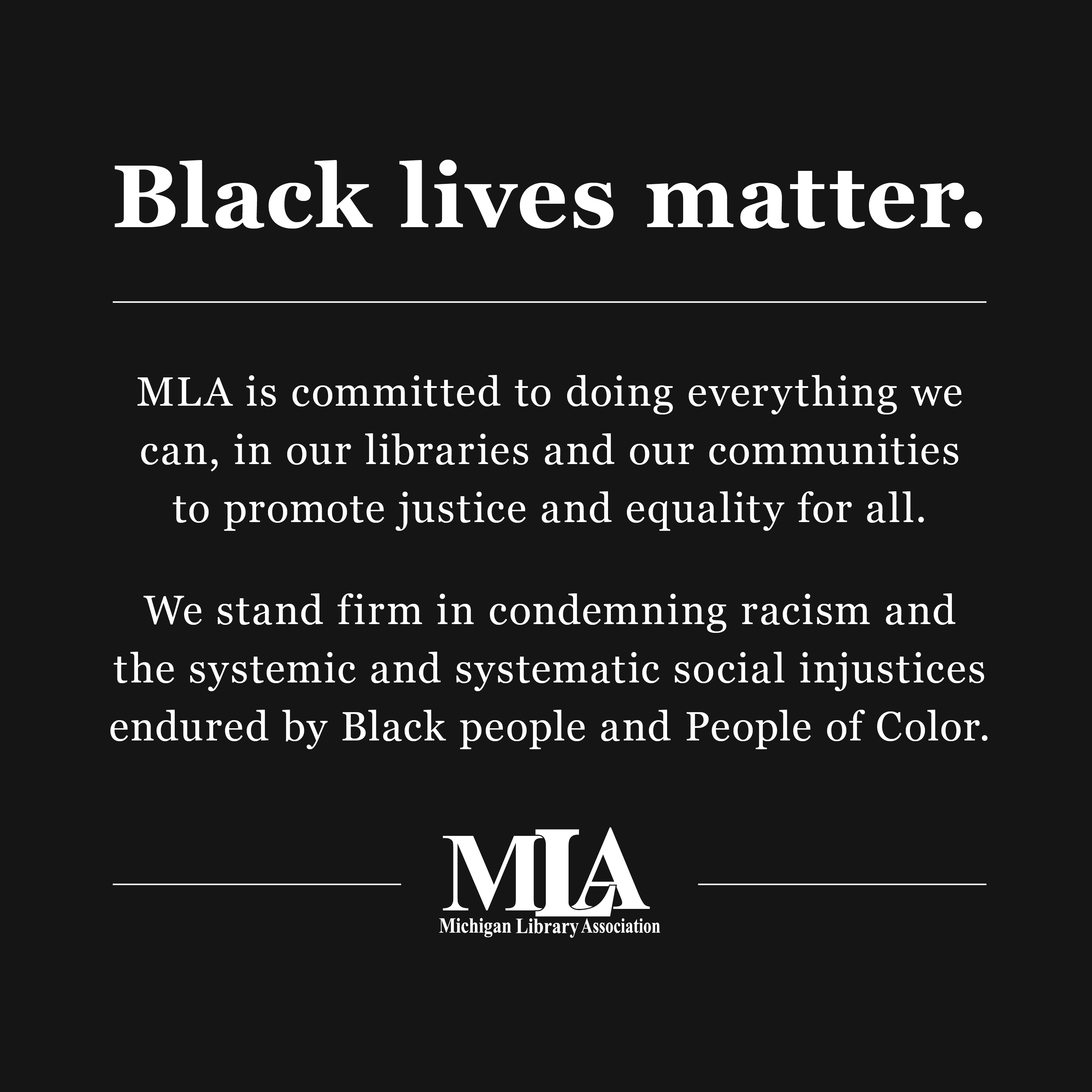 Statement in Solidarity with Black Lives Matter Statement in Solidarity with Black Lives Matter
Black lives matter. Let it be known that Michigan Library Association (MLA) stands in solidarity with the American Library Association (ALA), the Black Caucus of the American Library Association (BCALA), our library workers, our library patrons, our community leaders, and our community members, in condemning violence and racism towards Black Americans and People of Color. We hear and support everyone in our communities who have experienced feeling threatened, marginalized, and discriminated against because of their race or ethnicity.
Read Necessary Conversations on Institutional Racism A message from MLA President Kristin Shelley
Strategic Plan
Our 2023-2025 Strategic Plan serve as a road map for MLA and includes Equity, Diversity and Inclusion as a Strategic Priority and as a Belief and Guiding Principle.
Equity, Diversity and Inclusion Strategic Priority:
- We are committed to ensuring that all individuals who apply to, work with or otherwise interact with MLA are treated with fairness and respect and accorded equal opportunity. As a statewide organization, it is important that our programs and services are inclusive of all library personnel in all cities, townships, and villages, in rural, suburban and urban areas in both the Upper and Lower Peninsula. MLA will embrace, respect and adhere to the Elliott-Larsen Civil Rights Act as it guides our work.
Equity, Diversity and Inclusion Belief and Guiding Principle:
-
We believe that by investing in equity, diversity, accessibility and belonging that all our members will feel welcomed by MLA and will be energized and empowered to embrace an information-driven world with open eyes, hearts and minds.
We believe without a doubt, that this plan will guide us in expanding and improving how we deliver core services and help us envision a more culturally rich environment for Michigan through public, academic, school and special libraries. Read the full plan here.
MLA Equity, Diversity and Inclusion Statement
MLA's membership adopted and signed our first MLA Equity, Diversity and Inclusion Statement at the 2019 annual meeting that took place Thursday, October 17 during MLA 2019 Annual Conference at the Suburban Collection Showplace in Novi. MLA Board of Directors reaffirmed MLA's commitment to these values in 2021 and again in 2023.
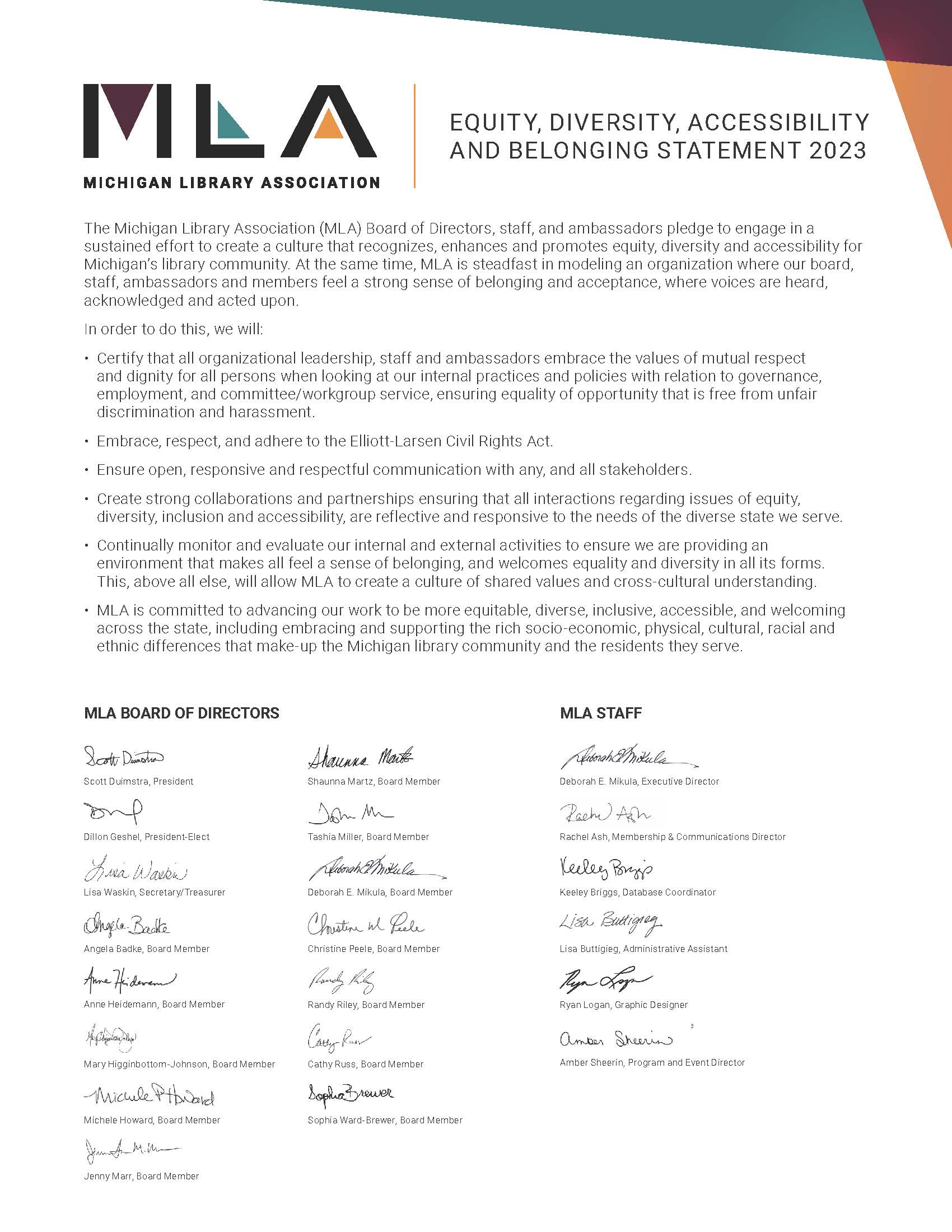
The Michigan Library Association (MLA) and its Board of Directors, staff, and volunteers are committed to recognizing, enhancing and promoting diversity, equity, and inclusion in all forms. MLA is committed to create an equitable and inclusive environment that fully supports and promotes our commitment to modeling diversity and inclusion for the entire library community, and to maintaining an inclusive environment with equitable treatment for all. In order to do this, we will:
-
Certify that all organizational leadership, staff and volunteers embrace the values of mutual respect and dignity for all persons when looking at our internal practices and policies with relation to governance, volunteer service, and employment, ensuring equality of opportunity that is free from unfair discrimination and harassment.
-
Ensure open, responsive and respectful communication with staff, members, volunteers, and any/all statewide stakeholders.
-
Create a strong collaboration and partnership with the community in any interactions regarding issues of diversity and equity, ensuring that we are reflective and responsive to the needs of the diverse state we serve.
-
Continually monitor and evaluate our internal and external activities to ensure we are providing an environment that welcomes equality and diversity in all its forms, allowing us to set an example of best practices to create a culture of shared values and cross-cultural understanding.
MLA is committed to expanding diversity and inclusiveness across the State, including embracing and encouraging the rich physical, cultural, racial and ethnic differences that make-up the Michigan library community.
Read the full statement here.
|




 Statement in Solidarity with Black Lives Matter
Statement in Solidarity with Black Lives Matter


